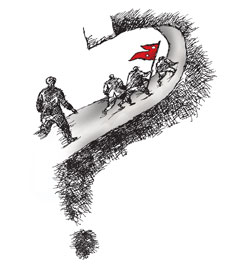 |
It has been ten years since the country's VDCs, DDCs and municipalities have remained without elected representatives. That is ten years too long.
The Maoists get a lot of blame for demolishing local democracy in this country by systematically targeting elected village and district councillors and bombing most VDC and DDC buildings during the war. But equally, if not more, destructive was the NC government in 2002 led by Sher Bahadur Deuba postponing local elections just because it didn't want the opposition UML to continue its dominance in local bodies. This created a vacuum in the villages which the Maoists easily filled with their terror-based approach to garnering local support.
Today, the constitution-writing process is derailed, we have no national parliament, the country is being ruled by a government that has outlived its mandate, it is led by a lame duck prime minister and a ceremonial president. If anyone were out to sabotage governance in this country, they couldn't have done a better job.
There is a deadline for constitutional amendment on 22 July which is most certainly not going to be met. Chances of elections for a new Constituent Assembly by November are slim which may not be altogether a bad thing. But what we need much more urgently is a functional parliament to get this country back on its feet. A new CA is just going to be another expensive dead-end, and too fraught for the fragile polity to handle. Even more outlandish is the proposal floated by those arrayed against the prime minister, to resurrect the old CA. As if that would resolve anything.
But there is one move that is doable and could, in a manner of speaking, kill a lot of birds with one stone: holding local elections. This would help untangle the hopelessly knotted politics, end this paralysing uncertainty, kick start local development, and get the country moving again. Given the current legal limbo, local elections would be the most constitutionally kosher thing to do.
This year's Himalmedia Public Opinion Survey in May showed extreme dissatisfaction among people about the prolonged absence of democracy, especially at the local level. The absence of elected local representatives has not only stalled development, it has bred corruption because VDCs and DDCs are run like three-party dictatorships. Asked when there should be new local elections, 41 per cent of respondents said 'right away' and 26 per cent said after the new constitution, but before the general election. This reaffirms the public perception that only grassroots democracy can deliver development services.
If there was one thing that worked in Nepal since 1990, it was grassroots democracy. It empowered elected village leaders to focus on the health, education and welfare of their constituents and allowed them to be re-elected based on performance. The councils could have been more inclusive, but as education levels improved, that would have happened.
At the village or district level, it doesn't really matter which party a candidate belongs to, as the best and most honest managers get the job so they can improve people's lives. In the absence of elected municipal councils, Nepal's cities are bursting at the seams with unplanned growth, crumbling infrastructure, mountains of garbage, and rivers that have turned into sewers. But all the big parties are reluctant to go for local elections because they are afraid of facing the people whom they have misled for so long.
National politics is a mess and hopelessly stuck. While we wait for party leaders to get their act together, the least they can do is fulfil the people's aspiration for representational local government.
Read also:
A democratic jolt, RUBEENA MAHATO
The NC and UML are dominated by failed and ageing alpha males from the past, it's time to make a clean break
Monsoon of the megalomaniacs, ANURAG ACHARYA
A new government made up of old leaders will mean the same old
Humanitarian fallout
Nepal's constitutional deadlock has humanitarian consequences for its people


